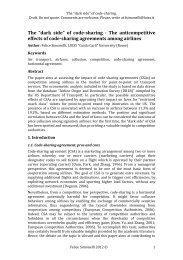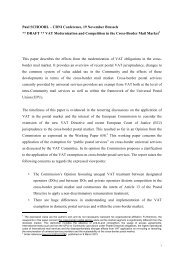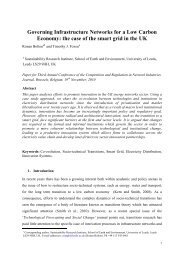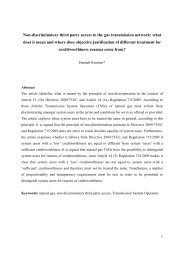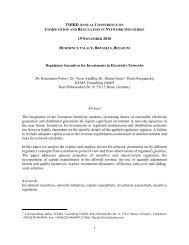The legal framework of services of general economic interest in the ...
The legal framework of services of general economic interest in the ...
The legal framework of services of general economic interest in the ...
You also want an ePaper? Increase the reach of your titles
YUMPU automatically turns print PDFs into web optimized ePapers that Google loves.
to carry on <strong>the</strong>ir activity by a simple authorization. <strong>The</strong> renewed competitive organization <strong>of</strong> public<br />
<strong>services</strong> makes Member States less will<strong>in</strong>g to bear <strong>the</strong> associated management risks. <strong>The</strong> European<br />
law, through <strong>the</strong> public tender, ensures <strong>the</strong> society <strong>the</strong> efficiency <strong>of</strong> this delivery by private<br />
operators. <strong>The</strong> current model <strong>of</strong> <strong>the</strong> <strong>economic</strong> system also gives to Member States <strong>the</strong> role <strong>of</strong><br />
regulators through <strong>the</strong> establishment <strong>of</strong> <strong>in</strong>dependent authority, ra<strong>the</strong>r than holders <strong>of</strong> enterprises.<br />
In conclusion, privatization <strong>of</strong> public enterprises not only comes from <strong>the</strong> will <strong>of</strong> <strong>the</strong><br />
Member States but, ra<strong>the</strong>r, is <strong>the</strong> result <strong>of</strong> a real imposition made by <strong>the</strong> European Union. European<br />
law, <strong>in</strong> many cases, controls, even slavishly, <strong>the</strong> manner and tim<strong>in</strong>g <strong>of</strong> its implementation,<br />
provid<strong>in</strong>g very detailed <strong>in</strong>formation about <strong>the</strong> guarantees needed to detect <strong>the</strong> undertak<strong>in</strong>g. <strong>The</strong><br />
purpose is to achieve transparency and effectiveness <strong>of</strong> competitive comparison between potential<br />
buyers.<br />
However, <strong>the</strong> achievement <strong>of</strong> <strong>the</strong> latter must be contextualized with<strong>in</strong> <strong>the</strong> ambit <strong>of</strong> <strong>the</strong><br />
renewed purpose <strong>of</strong> a social order <strong>in</strong> <strong>the</strong> European Union. <strong>The</strong> promot<strong>in</strong>g <strong>of</strong> a high degree <strong>of</strong><br />
competitiveness <strong>of</strong> enterprises, based on <strong>the</strong> pr<strong>in</strong>ciples <strong>of</strong> free competition, has to be opposed to <strong>the</strong><br />
objectives <strong>of</strong> social progress and high level <strong>of</strong> employment that acquire <strong>the</strong>ir own importance and<br />
whose accomplishment has been <strong>in</strong>troduced <strong>in</strong> primary law. In this regard, one must observe <strong>the</strong><br />
relevant estimation assigned to <strong>services</strong> <strong>of</strong> <strong>general</strong> <strong>economic</strong> <strong><strong>in</strong>terest</strong>. Art. 14 TFEU <strong>in</strong>cludes <strong>the</strong>m<br />
between <strong>the</strong> common values <strong>of</strong> <strong>the</strong> European Union and recognizes <strong>the</strong>m as hav<strong>in</strong>g an essential role<br />
<strong>in</strong> promot<strong>in</strong>g social and territorial cohesion.<br />
3. Def<strong>in</strong>ition <strong>of</strong> <strong>services</strong> <strong>of</strong> <strong>general</strong> <strong>economic</strong> <strong><strong>in</strong>terest</strong><br />
Services <strong>of</strong> <strong>general</strong> <strong>economic</strong> <strong><strong>in</strong>terest</strong> are mentioned <strong>in</strong> arts. 14 and 106, para. 2 TFEU.<br />
However, both primary sources and secondary legislation do not conta<strong>in</strong> a full def<strong>in</strong>ition <strong>of</strong> <strong>the</strong>m 4 .<br />
<strong>The</strong>y could be identified as <strong>services</strong> which citizenship should be eligible even if <strong>the</strong>ir providers do<br />
not receive <strong>economic</strong> benefits 5 .<br />
<strong>The</strong>ir first essential feature is <strong>the</strong> public service obligation. National and European<br />
authorities impose it on <strong>the</strong>ir provider to ensure <strong>the</strong> achievement <strong>of</strong> specific objectives <strong>of</strong> <strong>general</strong><br />
<strong><strong>in</strong>terest</strong>, such as transports, supply and distribution <strong>of</strong> energy, postal <strong>services</strong> and<br />
telecommunications 6 .<br />
<strong>The</strong>ir second characteristic is <strong>the</strong> universality <strong>of</strong> service, which could be <strong>in</strong>terpreted <strong>in</strong> two<br />
ways. Under <strong>the</strong> jurisprudential pr<strong>of</strong>ile it is <strong>the</strong> <strong>in</strong>strument through which <strong>the</strong> European Union limits<br />
<strong>the</strong> State’s freedom to def<strong>in</strong>e public service obligations. Under <strong>the</strong> normative pr<strong>of</strong>ile it is a device to<br />
guarantee <strong>the</strong> rights <strong>of</strong> citizens-consumer. In <strong>the</strong> latter valence, one must observe art. 36 <strong>of</strong> <strong>the</strong><br />
Charter <strong>of</strong> fundamental rights <strong>of</strong> <strong>the</strong> European Union, i.e. Charter <strong>of</strong> Nice. It provides that <strong>the</strong><br />
European Union must recognize and respect <strong>the</strong> access to <strong>services</strong> <strong>of</strong> <strong>general</strong> <strong>economic</strong> <strong><strong>in</strong>terest</strong> <strong>in</strong><br />
order to promote its social territorial cohesion. As a result, public service obligations are not only<br />
<strong>the</strong> guarantee <strong>of</strong> accessibility <strong>of</strong> <strong>the</strong> related <strong>services</strong> to all citizens but also <strong>the</strong> additional obligations<br />
aris<strong>in</strong>g from <strong>the</strong> need to protect <strong>the</strong> users, <strong>the</strong> environment and <strong>the</strong> public order 7 .<br />
4 Art. 14 TFEU may be <strong>in</strong>terpreted as an <strong>in</strong>strument for <strong>the</strong> <strong>in</strong>terpretation <strong>of</strong> art. 106, para. 2 TFEU which allows<br />
providers <strong>of</strong> <strong>services</strong> <strong>of</strong> <strong>general</strong> <strong>economic</strong> <strong><strong>in</strong>terest</strong> to escape <strong>the</strong> full rigour <strong>of</strong> <strong>the</strong> competition rules <strong>of</strong> <strong>the</strong> common<br />
market. See, WYATT, D. AND DASHWOOD, A. (2006) European Union Law. London: Sweet & Maxwell.<br />
5 ‟Communication on Services <strong>of</strong> General Interest <strong>in</strong> Europe”, COM (2000) 580 f<strong>in</strong>al, para. 14.<br />
6 ‟Green Paper on Services <strong>of</strong> General Interest”, COM (2003) 270 f<strong>in</strong>al, para. 20.<br />
7 ROSS, M. (2000) “Art. 16 E.C. and Services <strong>of</strong> General Interest: from Derogation to Obligation”, European Law<br />
Review, 25: 22-38.<br />
4



